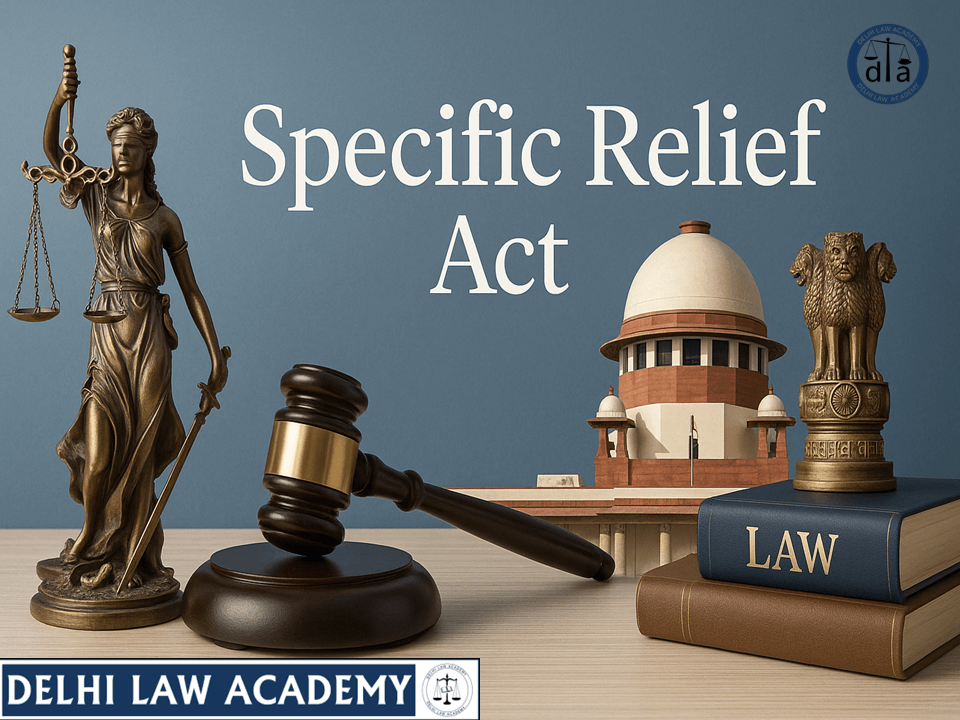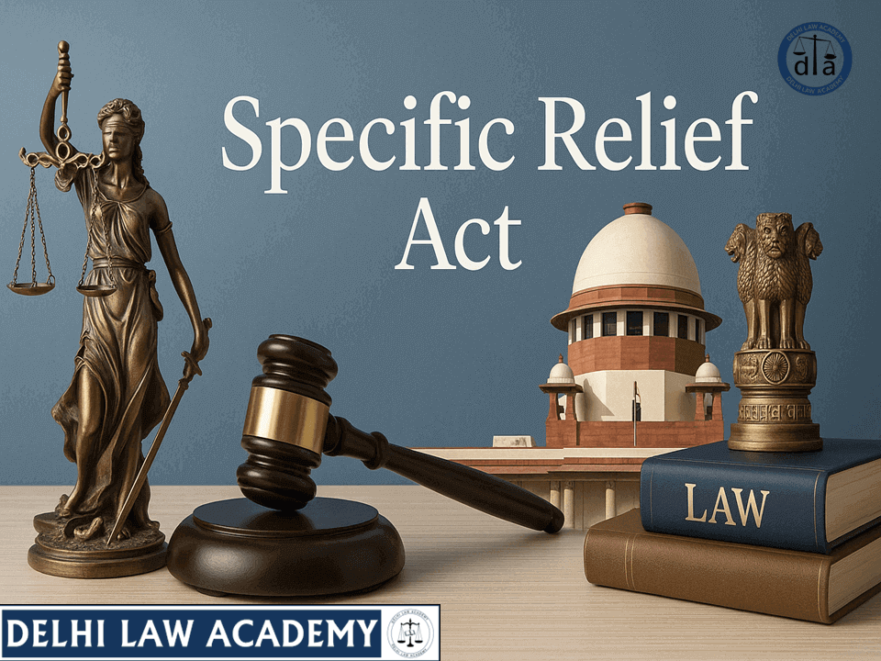
⚖️ SUPREME COURT ON SPECIFIC PERFORMANCE OF AGREEMENT TO SELL
Syed Dastagir v. T.R. Gopalakrishna [1999]
“The language in Section 16 (c) does not require any specific phraseology but only that the plaintiff must aver that he has performed or has always been and is willing to perform his part of the contract. So the compliance of Readiness and willingness has to be in spirit and substance and not in letter and form.”
“Plaintiff can always tender the amount to the defendant or deposit it in court, towards performance of his obligation under the contract. Such tender rather exhibits willingness of the plaintiff to perform his part of the obligation. What is not essential only means need not do but does not mean he cannot do so.”
Delhi Law Academy Jaipur presents below for aspirants of Rajasthan Judicial Service (RJS), DJS, PCS (J) and other Judicial Services throughout India a very important judgment of the Supreme Court of India in Syed Dastagir v. T.R. Gopalakrishna [1999].
Presented below: Summarized version [by Delhi Law Academy Jaipur] of the Supreme Court Judgment in the case of Syed Dastagir v. T.R. Gopalakrishna [1999] granting a decree for specific performance.
Original language of the judgment has been maintained; it has not been disturbed or replaced]
In this case the Supreme Court granted a decree for specific performance of the agreement to sell.
📘 SYED DASTAGIR V. T.R. GOPALAKRISHNA [1999]
🧑⚖️ J U D G M E N T
The short question raised in this appeal is, how to construe a plea of readiness and willingness to perform to sub-serve to the requirement of Section 16(c) of the Specific Relief Act and the interpretation of its explanation. The appellant-plaintiff filed a suit for specific performance of an agreement to sale dated 11th August, 1960.
❓ Question before the Court
So whole gamut of issue raised is, how to construe a plea specially with reference to Section 16(c) and what are the obligations which the plaintiff has to comply with reference to his plea and whether the plea of the plaintiff could not be construed to conform to the requirement of the aforesaid Section, or does this section require specific words to be pleaded that he has performed or has always been ready and is willing to perform his part of the contract.
⚖️ Law laid down by the Court
In construing a plea in any pleading, Courts must keep in mind that a plea is not an expression of art and science but an expression through words to place fact and law of ones case for a relief. Such an expression may be pointed, precise, some times vague but still could be gathered what he wants to convey through only by reading the whole pleading, depends on the person drafting a plea.
Thus, to gather true spirit behind a plea it should be read as a whole. This does not distract one from performing his obligations as required under a statute. But to test, whether he has performed his obligations one has to see the pith and substance of a plea. Where a statute requires any fact to be pleaded then that has to be pleaded may be in any form. Same plea may be stated by different persons through different words then how could it be constricted to be only in any particular nomenclature or word.
Unless statute specifically require for a plea to be in any particular form, it can be in any form. No specific phraseology or language is required to take such a plea. The language in Section 16 (c) does not require any specific phraseology but only that the plaintiff must aver that he has performed or has always been and is willing to perform his part of the contract. So the compliance of Readiness and willingness has to be in spirit and substance and not in letter and form. So to insist for mechanical production of the exact words of an statute is to insist for the form rather than essence. So absence of form cannot dissolve an essence if already pleaded.
📄 Application of this law to the facts of this case
Returning to the facts of the present case we find the aforesaid pleading recites that all balance amount of the consideration under the contract has been paid by the plaintiff of which there is an endorsement by the defendant except the balance amount of Rs.120 about which also there is a specific plea that he has tendered the same in the Court. It is true in the pleading the specific word ready and willing to perform in this nomenclature is not there but can aforesaid plea, could be read that plaintiff was not ready to willing to perform his part of his obligation? In other words, can it be said he has not pleaded that he is ready and willing to perform his part?
Courts cannot draw any inference in abstract or to give such hyper technical interpretation to defeat a claim of specific performance which defeats the very objective for which the said Act was enacted. The Section makes it obligatory to a plaintiff seeking enforcement of specific performance, that he must not only come with clean hands but there should be a plea that he has performed or has been and is ready and willing to perform his part of the obligation. Unless this is there, Section 16 (c) creates a bar to the grant of this discretionary relief. As we have said for this it is not necessary to plea by any specific words, if through any words it reveals the readiness and willingness of the plaintiff to perform his part of obligation then it cannot be said there is non-compliance of the said Section.
📘 Effect of the Explanation
It is significant that this explanation carves out contract which involves payment of money as a separate class from Section 16(c). Explanation (i) uses the words it is not essential for the plaintiff to actually tender to the defendant or to deposit in court any money except when so directed by the court. This speaks in negative term what is not essential for plaintiff to do. This is more in support of plaintiff that he need not tender to the defendant or deposit in Court any money but the plaintiff must (as per explanation ii) at least aver his performance or readiness and willingness to perform his part of the contract.
This does not mean that unless the court directs the plaintiff cannot tender the amount to the defendant or deposit in the Court. Plaintiff can always tender the amount to the defendant or deposit it in court, towards performance of his obligation under the contract. Such tender rather exhibits willingness of the plaintiff to perform his part of the obligation. What is not essential only means need not do but does not mean he cannot do so. Hence, when the plaintiff has tendered the balance amount of Rs.120 in court even without court’s order, it cannot be construed adversely against the plaintiff under explanation (i).
In interpreting a pleading wherever there be two possible interpretations, then the one which defeats justice should be rejected and the one which sub-serve to justice should be accepted.
✅ Conclusion
Finally, we have no hesitation to hold that the pleading as made by the plaintiff not only shows his readiness and willingness to perform his part of obligation under the contract but by tendering total amount shows he has performed his part of the obligation. We also construe such a plea to be a plea of readiness and willingness as required under Section 16 (c).
📜 Order of the Court
Accordingly, the impugned order of the High Court dated 22nd October, 1986 is set aside.
***********
📚 Continue Your Specific Relief Act Preparation
Don’t stop here! Strengthen your knowledge of the SRA with our other fully solved tests:
📘 Free Study Material for Judiciary Aspirants!
Download our FREE study material prepared by Delhi Law Academy’s expert faculty.
💬 Frequently Asked Questions on Specific Performance & Section 16(c)
Contact us
📍 Delhi Law Academy – Jaipur Branch
6C, Tower 2, Coaching Hub, Pratap Nagar, Jaipur – 302033
📞 Phone:
+91 9911916552
+91 8447285606
✉️ Email:
contactus@delhilawacademy.com

